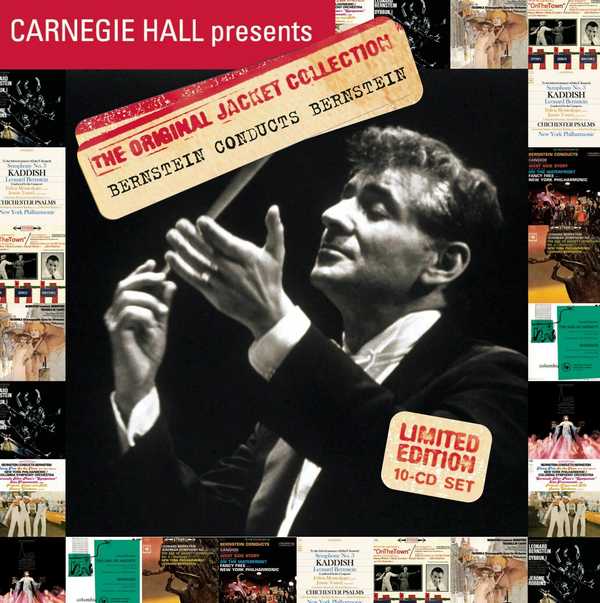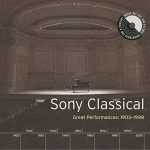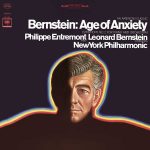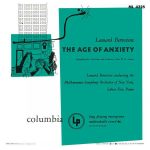
Composer: Leonard Bernstein
Conductor: Leonard Bernstein
Number of Discs: 10
Format: FLAC (tracks)
Label: Sony
Catalogue: 88697279882
Release: 2008
Size: 2.71 GB
Recovery: +3%
Scan: yes
CD 01
01. Overture to Candide: Allegro molto con brio
Symphonic Dances (From “West Side Story”)
02. I. Prologue (Allegro moderato)
03. II. Somewhere (Adagio)
04. III. Scherzo (Vivace leggiero)
05. IV. Mambo (Meno presto)
06. V. Cha-Cha, “Maria” (Andantino con grazia)
07. VI. Meeting Scene (Meno mosso)
08. VII. Fugue, “Cool” (Allegretto)
09. VIII. Rumble (Molto allegro)
10. IX. Finale (Adagio)
Symphonic Suite (From the Film “On The Waterfront”)
11. Andante (with dignity) – Presto barbaro Presto barbaro
12. Adagio – Allegro molto agitato – Alla breve (Poco più mosso) – Presto come prima
13. Andante largamente – More Flowing – Still More Flowing – Poco meno mosso – Lento
14. Moving Forward, with Warmth – Largamente – A tempo – Calmato – Andante come prima – Sempre avanti, With Intensity – Ancora più mosso
15. Allegro non troppo, molto marcato – Poco più sostenuto – Moving Forward – Meno mosso
16. A tempo
Fancy Free Ballet
17. I. Enter Three Sailors
18. II. Scene at the Bar
19. III. Enter Two Girls
20. IV. Pas de deux
21. V. Competition Scene
22. VI. Three Dance Variations: Variation I (Galop)
23. Variation II (Waltz)
24. Variation III (Danzon)
25. VII. Finale
CD 02
Symphony No. 1 “Jeremiah”
01. I. Prophecy
02. II. Profanation
03. III. Lamentation
Symphony No. 2 “The Age of Anxiety”
04. Pt. 1a, The Prologue. Lento moderato
05. Pt. 1b, The Seven Ages. Variations 1 – 7
06. Pt. 1c, The Seven Stages. Variations 8 – 14
07. Pt. 2a, The Dirge. Largo
08. Pt. 2b, The Masque. Extremely Fast
09. Pt. 2c, The Epilogue. L’istesso tempo
I Hate Music
10. No. 1, My Name Is Barbara
11. No. 2, Jupiter Has Seven Moons
12. No. 3, I Hate Music!
13. No. 4, A Big Indian and a Little Indian (Riddle Song)
14. No. 5, I’m a Person Too
La bonne cuisine (Four Recipes)
15. No. 1, Plum Pudding
16. No. 2, Queues de boeuf
17. No. 3, Tavouk guenksis
18. No. 4, Civet à toute vitesse
CD 03
The Age of Anxiety – Symphony No. 2 for Piano and Orchestra (after W.H. Auden)
01. Part I – a) The Prologue
02. Part I – b) The Seven Ages (Variations I-VII)
03. Part I – c) The Seven Stages (Variations VIII-XIV)
04. Part II – a) The Dirge
05. Part II – b) The Masque
06. Part II – c) The Epilogue
Serenade for Solo Violin, Strings, Harp and Percussion after Plato’s “Symposium” (1954)
07. I. Phaedrus: Pausanias (Lento – Allegro)
08. II. Aristophanes (Allegretto)
09. III. Eryximachus (Presto)
10. IV. Agathon (Adagio)
11. V. Socrates: Alcibiades (Molto tenuto – Allegro molto vivace)
CD 04
Symphony No. 3 “Kaddish” (To the Beloved Memory of John F. Kennedy)
01. I. Invocation
02. II. Din-Torah
03. III. Scherzo
Chichester Psalms
04. I. Psalm 108:2 “Urah, hanevel, v’chinor!” – Psalm 100 “Hariu l’Adonai kol haarets”
05. II. Psalm 23 “Adonai ro-i, lo e?sar” – Psalm 2:1-4 “Lamah rag’shu goyim”
06. III. Psalm 131 “Adonai, Adonai” – Psalm 133:1 “Hineh mah tov”
CD 05
Prelude, Fugue & Riffs
01. I. Prelude
02. II. Fugue
03. III. Riffs
On the Town
04. The Great Lover
05. Lonely Town. Pas de deux
06. Times Square, 1944
Serenade after Plato’s “Symposium” for Solo Violin, Strings, Harp and Percussion
07. I. Phaedrus: Pausanias (Lento – Allegro marcato)
08. II. Aristophanes (Allegretto)
09. III. Erixymathus (Presto)
10. IV. Agathon (Adagio)
11. V. Socrates: Alcibiades (Molto tenuto – Allegro molto vivace)
Fancy Free – Ballet
12. I. Enter Three Sailors
13. II. Scene at the Bar
14. III. Enter Two Girls
15. IV. Pas de Deux
16. V. Competition Scene
17. VI. Three Dance Variations: Variation 1 (Galop)
18. Variation 2 (Waltz)
19. Variation 3 (Danzon)
20. VII. Finale
CD 06
Dybbuk (Complete Ballet)
01. Part I: The Community
02. The Fathers
03. Witnesses of Birth
04. The Children
05. Part II: Kabbalah: Six Variations
06. Part III: Witnesses of Death
07. Leah
08. Possession
09. Exorcism
10. The Community
CD 07
Trouble in Tahiti – An Opera in Seven Scenes
01. Prelude
02. Scene I: “How could you say the thing that you did”
03. Scene II: “Yes? Oh, Mister Partridge!”
04. Scene III: “I was standing in a garden!”
05. Scene IIIa: “Then desire took hold inside me”
06. Scene IV: “Well, of all people”
07. Interlude:”Skid a lit day”
08. Scene V:”There’s a law”
09. Scene VI:”What a movie!”
10. Scene VIa:”There’s a law that a man has to pay for what he gets”
11. Scene VII:”Evenin’ shadows are spreadin’ softly”
Facsimile – Choreographic Essay for Orchestra
12. Part I – Molto Adagio
13. Part II – Allegretto
CD 08
On the Town
01. Act I: Opening: New York, New York
02. Act I: Come Up to My Place
03. Act I: Carried Away
04. Act I: Lonely Town
05. Act I: Carnegie Hall (Do-Do-Re-Do)
06. Act I: I Can Cook, Too
07. Act I: Lucky to Be Me
08. Act I: Dance – Times Square
09. Act II: Night Club Sequence: So Long, Baby – I’m Blue – Ya Got Me
10. Act II: I Understand
11. Act II: Ballet: The Imaginary Coney Island: Subway Rider – Dance of the Great Lover – Pas de Deux
12. Act II: Some Other Time
13. Act II: Dance – The Real Coney Island
14. Act II: Overture to On the Town
CD 09
Mass A Theatre Piece for Singers, Players and Dancers I
01. I. Devotions before Mass: 1. Antiphon: Kyrie eleison
02. 2. Hymn and Psalm: “A Simple Song”
03. 3. Responsory: Alleluia
04. II. First Introit (Rondo): 1. Prefatory Prayers
05. 2. Thrice-Triple Canon: Dominus vobiscum
06. III. Second Introit: 1. In nomine Patris
07. 2. Prayer for the congregation (Chorale: “Almighty Father”)
08. 3. Epiphany
09. IV. Confession: 1. Confiteor
10. 2. Trope: “I Don’t Know”
11. 3. Trope: “Easy”
12. V. Meditation No. 1
13. VI. Gloria: 1. Gloria tibi
14. 2. Gloria in excelsis
15. 3. Trope: “Half of the People”
16. 4. Trope: “Thank You”
17. VII. Meditation No. 2
18. VIII. Epistle: “The Word of the Lord”
19. IX. Gospel-Sermon: “God Said”
CD 10
01. X. Credo: 1. Credo in unum Deum
02. 2. Trope: “Non Credo”
03. 3. Trope: “Hurry”
04. 4. Trope: “World Without End”
05. 5. Trope: “I Believe in God”
06. XI. Meditation No. 3 (De profundis, part 1)
07. XII. Offertory (De profundis, part 2)
08. XIII. The Lord’s Prayer: 1. Our Father…
09. 2. Trope: “I Go On”
10. XIV. Sanctus
11. XV. Agnus Dei
12. XVI. Fraction: “Things Get Broken”
13. XVII. Pax: Communion (“Secret Songs”)
Bernstein Conducts Bernstein is the ultimate tribute to the legendary composer and conductor Leonard Bernstein – specially created to celebrate the 90th anniversary of his birth in 2008. This 10-disc set includes all of Bernstein’s own definitive recordings of his greatest works as a composer – many recorded during his historic years as Music Director of the New York Philharmonic – from his first exuberant Broadway musical On the Town and the explosive Symphonic Dances from West Side Story to his heartbreakingly beautiful “Kaddish” Symphony and the radiant hope of the Chichester Psalms– as well as the complete world premiere recording of his Mass.
How much do you like Leonard Bernstein? Carnegie Hall is betting you like him a lot as it has collaborated with Sony to prepare this 10-CD set, The Original Jacket Collection: Bernstein Conducts Bernstein. It contains every album Bernstein made of his own music for CBS Records, beginning with his 1950 recording of the Symphony No. 2, “The Age of Anxiety” — predating his tenure with the New York Philharmonic by nearly a decade — to the ballet Dybbuk in 1974, recorded with the New York City Ballet Orchestra several years after his departure. This was Bernstein’s peak period in terms of his popularity, fame, credibility, and celebrity, although once he started with the New York Philharmonic his work as a composer came to a screeching halt. Despite the date range indicated above, a heavy concentration of these recordings is centered in 1960 and 1963, indicating an effort in these years to schedule his work in large blocks amid the staggering number of recordings of works by other composers Bernstein made on his CBS contract.
This set is amazingly comprehensive; both mono and stereo versions of Serenade, The Age of Anxiety, and Fancy Free are included. While standard practices usually dictate a choice between alternate mono and stereo versions that invariably goes in favor of stereo, often mono recordings contain better performances, decidedly the case in Fancy Free; it’s certainly best to have both when possible. Moreover, it is great to have access to Zino Francescatti’s rendering of Serenade in addition to the more famous and oft reissued version with Isaac Stern. With The Age of Anxiety, in addition to a technological difference, there is an alternate version of the symphony itself, as it was revised by Bernstein in 1965 at pianist Philippe Entremont’s request.
The discs themselves seem to correspond exactly with already issued entries in Sony’s Bernstein Century series. Each individual disc is graced with miniature versions of vintage album covers that roughly correspond to the disc’s content; “roughly,” as each disc is maximized, save the two discs of Bernstein’s Mass, appearing as originally programmed. The quality of repro on these little album covers is excellent, though to read the liner notes you will need a magnifying glass — the original liners are nevertheless legible except for the libretto to Trouble in Tahiti. Within the booklet, there are purported excerpts “from the original liner notes” throughout, but these are not original notes and were culled instead from CD reissues. However, Sony did finally manage to locate the original album art to Bernstein’s Mass, for years believed lost in the CBS archives. The booklet could be organized a little better; there is no central track listing proper as notes and listings for individual discs are parsed throughout the booklet with a table of contents given, by disc and page number, at the front. Despite this feature, you can still spend quite some time thumbing back and forth through the booklet trying to figure out what is on which disc. Sound quality in Bernstein’s Columbia recordings varies with the general fortunes of the CBS Masterworks division; in mono, the sound is inexplicably gritty and shrill and early stereo recordings sound terrific, though the later they are, the more this tends to decline. Some successful effort is made in terms of conveying the quadraphonic perspective of Bernstein’s Mass in a conventional CD format.
How is the music? Well, that goes back to the question of “how much do you like Leonard Bernstein?” To some extent, Bernstein’s Columbia recordings of his own work are compromised by hasty preparation and Bernstein’s own inability to exploit what was best within his own work. There are two serenades and two “Anxieties,” but only the overture from Candide and only the Symphonic Dances from West Side Story. Dybbuk isn’t viewed in any quarter as being one of Bernstein’s shining achievements, and just about everyone who has recorded Chichester Psalms — even Bernstein himself in 1977 for Deutsche Grammophon — has found a way to improve on the dismal 1965 effort included here. However, Trouble in Tahiti is a small miracle; an excellent recording of a work he didn’t undertake very often, and one would have to lobby hard for a recording of Prelude, Fugue and Riffs that’s superior to Bernstein’s with Benny Goodman. With The Original Jacket Collection: Bernstein Conducts Bernstein, the whole is better than the sum of its parts; for purposes of study and appreciation of his recorded work in depth, having all of these selections in one package is invaluable. Likewise, for Carnegie Hall to have supported this project is a moving gesture to a man who essentially gave up his personal artistic pursuits to put butts in their seats, night after night, for 10 years running.
This package follows the design of the 2001 collection The Original Jacket Collection: Leonard Bernstein so closely that you might have to look twice to make sure you have the right set.




Hello. Could you upload this file please? Thanks.